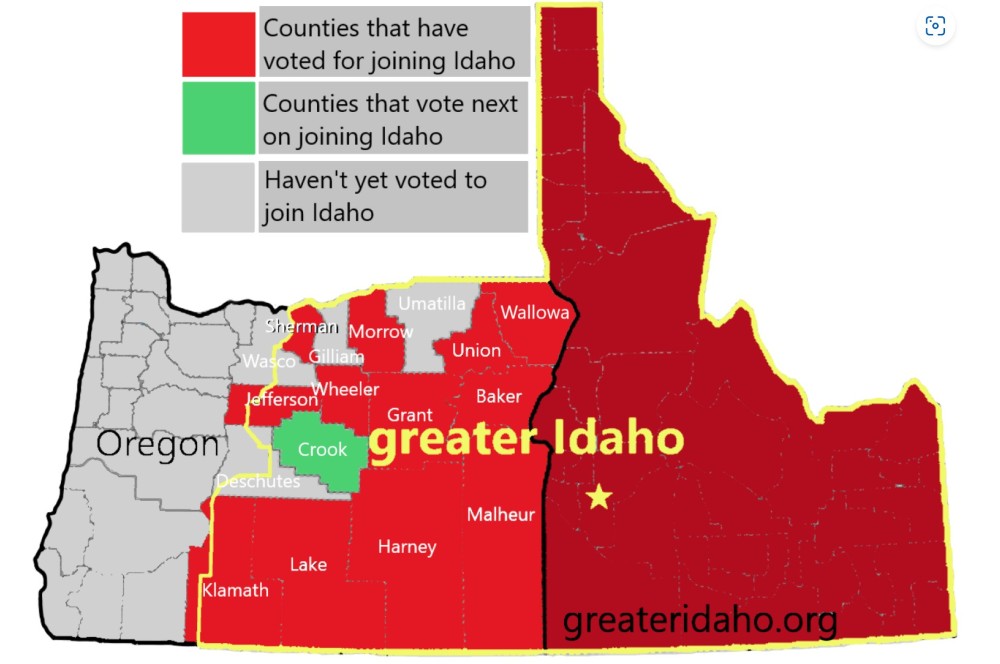As this week ends we are Northeastern Oregon, or to be specific, Wallowa County. To put an even finer point on it, we’re at the cabin built by my grandparents near Wallowa Lake. The cabin, at least the original part of it, dates to 1926, and so turns 100 in a couple years. Do people celebrate cabin “anniversaries”? I imagine we shall, but I have no idea how. Suggestions for observing a cabin centennial are hereby invited.
Since the cabin is not “winterized,” we close up completely from mid-October to mid-May. Then there’s a long, hard, mountain winter. We call our May visit “opening up.” Turn the water on, air the place out, clean and dust, reclaim the lawn from a million sticks and limbs that have fallen during the long winter, rake and mow and generally apply a lot of TLC to a place that looks pretty forlorn — but then — shakes off the dust and gets up wagging its tail.
Earlier this month, the voters of Wallowa County had before them a measure popularly known as “Greater Idaho.” The ultimate hope of its supporters is to exit Oregon and enter the great State of Idaho by Idaho’s extending its western border to take in parts of eastern Oregon. To which this fourth generation Oregonian says, “If you want to live in Idaho, fine, move there!” Anyhow, the vote passed by a small margin, like 10 votes, with about 3,500 people turning out to vote. Given that the population of the county is about 7,000, that seems like a high turnout.
But the margin is small enough to kick in a recount. Even if it passes there will be no immediate succession. The effect of the vote is to require the County Council to have twice-a-year discussions as to the possible benefits of a move or annexation. However, in a little oddity, the ballot measure failed to actually specify “Idaho,” so I guess the commissioners could consider becoming a part of New Mexico or Maine. Maybe sell to the highest bidder? Should you be wondering why roughly half of the voters here want to be incorporated into Idaho, the general answer is that people say they aren’t understood or represented over in the state capitol in Salem (my birthplace!) on the other side of the Cascade Mountains.
But there’s actually a bit more disturbing element to all this. A growing number of Americans are deciding where to live based on politics. This past winter I chatted with a contractor at a bar in Wenatchee, Washington who said the main reason for the influx of people there is they want to be “in a red area.” My guess is that many of Greater Idaho folks would rather be in a red state than a blue one. Apparently, there are now realtors who specialize in relocating people to a state of their political preference. I mean why rub elbows with people you don’t agree with?
Discover more from Post Alley
Subscribe to get the latest posts sent to your email.

Unlike Eastern Washington, Eastern Oregon doesn’t have a major State University or a metropolitan city, so it’s understandable that they can feel marginalized.
It is unfortunate to feel unrepresented and not understood by their state political leadership. Seems like an opportunity to open up more dialogue to find common ground. Certainly the Oregon state legislators from Eastern Oregon still make their voice heard on legislation. The transportation system of Eastern and southern Oregon surely is a worthy investment by Oregon tax payers from across the state and is one asset all of Oregon can agree about. The average northwestern Oregon wage earner, subsidizes Eastern and Southern Oregon counties by $690 annually, according to a thorough independent economic analysis funded by the Claremont Institute. That means the most liberal areas of Oregon provide most of the funds that help eastern Oregon manage a wide variety of programs that directly benefit the people who just voted to join Idaho. Something to think about.
High-income areas around Portland end up carrying almost all of the state’s tax burden, due to Oregon’s choice of a progressive income tax to fund the bulk of its government.
https://points-consulting.com/wp-content/uploads/2023/02/Economic-Impact-Oregon-Idaho-Border.pdf
Eastern Oregon and Eastern Washington always identified more with Portland than Seattle, since the river routes and the railroads ran to Portland. Make more sense to join those two eastern regions, than Idaho, where the politics runs deep red? And while we’re shifting boundaries, might it make sense to have Vancouver become part of greater Portland, since it’s a suburb of the Rose City?
Another interesting consideration will be what to do with the new, lucrative and tax base contributing cannabis farms and dispensaries in eastern Oregon and eastern Washington should the move to Idaho become more certain. Idaho’s current legislature and Governor are committed to keeping THC strong cannabis illegal to grow and dispense. Once those counties start looking at their ledger sheets their leaders may have second thoughts. David Brewster’s idea to make them all part of “Greater Portland” makes better budget sense. And a big plus, give the Portlandia series more interesting episodes…..But not Vancouver, it is finally becoming a cool city all on its own. SW Washington needs it!